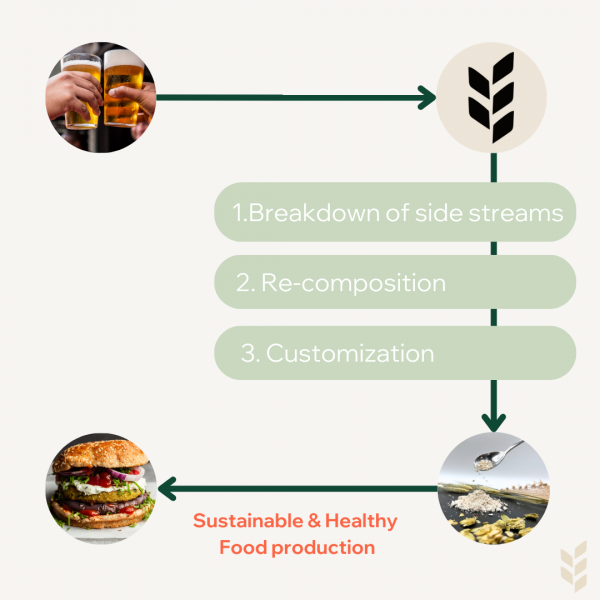
Esslingen / Berlin – 19.06.2024
As the demand for plant-based foods soars, so does the urgency to find sustainable protein sources for their production. The current strain on natural resources continues to pose a high physical risk in the face of climate change and growing global populations, and the food sector is a critical player in this regard.
It is also a material risk for companies in the food sector which greatly rely on these natural resources. In the dynamic realm of food ingredients, ProteinDistillery provides a compelling solution by upcycling spent yeast, such as from brewers, into clean-label, high-quality protein ingredients. Ultimately enabling food businesses to produce better plant-based products and partners such as breweries to valorize their side streams – all with a lower climate footprint.
By integrating upcycled ingredients, such as spent yeast, food producers can reduce their carbon footprint by up to 30%, as highlighted by this FAO study. Furthermore, they can also reduce their negative impact on water sources and land use, a well-known challenge associated with other protein sources available in the market. From an economic perspective, circular economy initiatives could increase EU GDP by an additional 0.5% by 2030, creating around 700,000 new jobs, according to the European Commission, and could cut carbon dioxide emissions by 48%, per this Ellen McArthur Foundation report. ProteinDistillery’s approach aligns perfectly with these projections, showcasing the tangible benefits of circular solutions in food technology.
ProteinDistillery’s innovative process provides a scalable solution for food companies aiming to meet their sustainability goals, from the environmental and social side. From food companies invested in plant-based products to those looking to expand or create new business with their side streams, partnering with ProteinDistillery to incorporate upcycled protein ingredients can help them meet sustainability goals, appeal to conscious consumers and meet regulatory requirements. Moreover, these collaborations can drive innovation, creating new product lines that stand out in a competitive market.
We are committed to making plant-based the new norm in the food industry and having a positive impact together with our partners in the ecosystem. As we expand our capacities, we are also looking to collaborate with more businesses worldwide, such as breweries, that would like to valorize side streams like spent yeast. If you are looking for such a collaboration with ProteinDistillery, please fill out a company form and our team will get in touch with you soon. Stay tuned!
Ellen MacArthur Foundation. (2019). Completing the Picture: How the Circular Economy Tackles Climate Change. Retrieved from https://www.ellenmacarthurfoundation.org/publications/completing-the-picture-climate-change
European Commission. (2020). Circular Economy Action Plan. Retrieved from https://ec.europa.eu/environment/circular-economy/
Food and Agriculture Organization of the United Nations. (2013). Tackling climate change through livestock: A global assessment of emissions and mitigation opportunities. Retrieved from http://www.fao.org/3/i3437e/i3437e.pdf